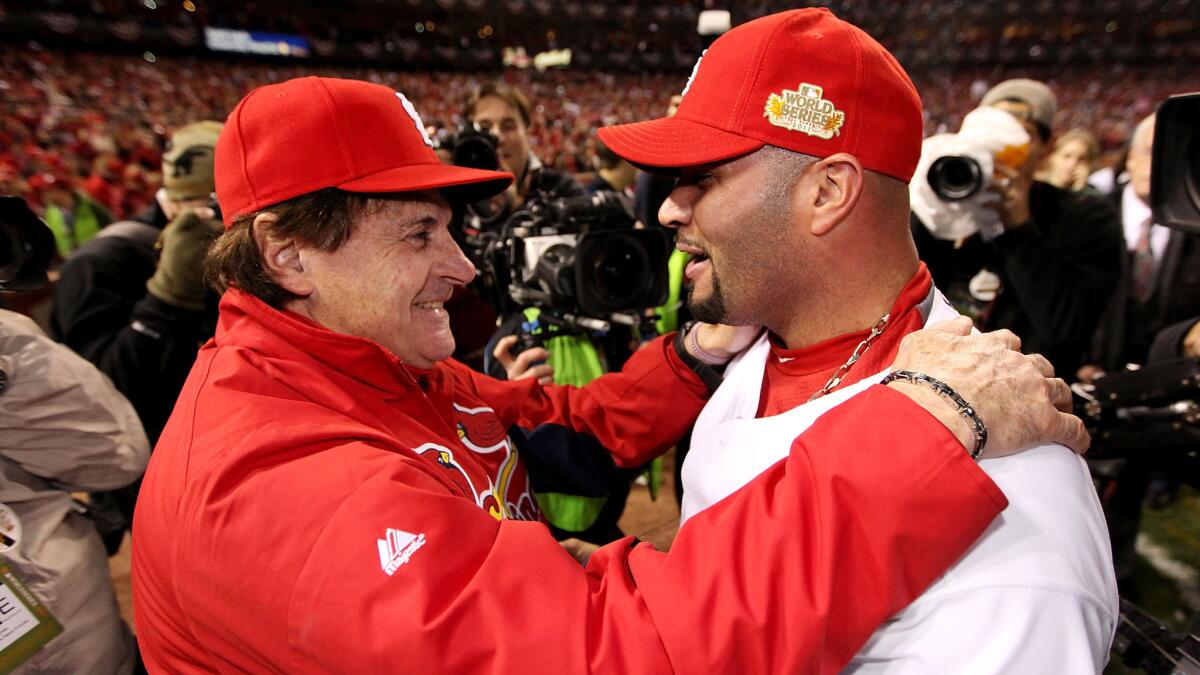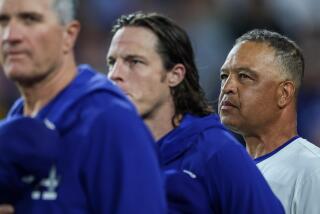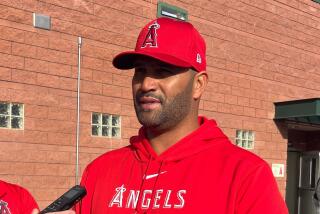Angels say playoff experience matters little in postseason

Before David Freese had one of the best postseasons in baseball history, Albert Pujols came forward to offer advice. This was Freeseâs first time in the playoffs, and Pujols wanted to impart some wisdom.
âIt goes by fast,â Freese recounted Pujols saying. âSo have fun with it.â
By that point, Pujols had reached the playoffs for the seventh year. He had won a World Series title. He had the all-important postseason experience â 56 games of it. And those 56 games led him to this secret to postseason success: There really isnât a secret at all.
Around baseball, the collective wisdom states that the more playoff experience you have, the better youâll perform. Read any postseason coverage or watch any preview shows, and experience (or the lack of it) will be cited as asset or obstacle. Some cling to this notion because it just seems to make sense.
On Tuesday, Josh Hamilton was asked whether postseason experience is valuable. He hardly even entertained the question.
âYeah,â Hamilton said. âGood answer. Next.â
But baseball researchers and other Angels postseason veterans dismiss that notion. Russell A. Carleton at Baseball Prospectus, for example, examined every postseason at-bat from 1995 to 2012. He found that experience had no effect on performance.
In other words, history says the Angelsâ young and untested players such as Mike Trout, Kole Calhoun, Chris Iannetta and Matt Shoemaker have no handicap because of their inexperience.
âNone whatsoever,â said Manager Mike Scioscia. âThereâs no such thing as a spring-training game, a regular-season game or a pennant-race game or a playoff game, and if youâre going to be successful, you need to bring that mind-set onto the field where youâre playing free and playing baseball.â
The Angels have plenty of games of postseason experience, but they come from a small number of players. Pujols has played 74 games, Freese 48 and Hamilton 34. Jered Weaver and C.J. Wilson combined for 12 postseason starts, and a handful of others have played at least a series.
The big question mark is Trout, who is the gameâs best hitter but has yet to play in October. His past provides no other clues.
âIâve never won,â Trout said. âNot even high school.â
Scioscia pointed out that his 2002 team wasnât experienced either. In fact, every player but one on the roster had no prior postseason experience â a grand total of 10 1/3 innings. And they won the World Series.
During Freeseâs dramatic 2011 postseason, when the St. Louis Cardinals won the World Series, many players were playing in October for the first time. Freese, who was one of them, batted .397 with five home runs and 21 runs batted in in 2011, and he won the National League Championship Series and World Series most valuable player awards. He has been back to the playoffs twice and has batted .228.
That first year he just got hot at the right time. The key was to âunderstand that itâs not just baseball,â he said, âbut it is.â
With that Cardinals team, Pujols was the guru, offering his knowledge to some, advising others not to force or change anything.
Pujols said itâs part of a cycle. When he was a rookie in 2001, players such as Edgar Renteria mentored him. As Pujols became a veteran, he took Yadier Molina under his wing, dispensing wisdom. He told Molina it was Pujolsâ duty, as it would someday be Molinaâs.
Now both Freese and Pujols can offer advice. Trout has already approached Pujols, and the message was to just be yourself.
Mostly, the goal is just to reassure beforehand. Once the games start, the players can find comfort in the familiar.
âThey donât change the baseball, they donât change the distance of the base,â Pujols said. âEverything is the same, so I think â hope â the young players and the guys that havenât been in this situation, hopefully they donât put too much pressure that they need to change their approach. The game is the same.â
Pujols has a maxim he is fond of repeating. There are only three times, he says, he gets nervous playing baseball. The first is the initial at-bat in spring training. Same for the first at-bat in the regular season and the postseason too.
After that, he says, he can just relax.
In 2001, Pujolsâ first postseason at-bat came against Curt Schilling. In the next game, the starter was Randy Johnson.
Surely then, it must have taken Pujols a series to feel comfortable, right?
âIf I told you that it did,â Pujols said, âIâm lying.â
More to Read
Go beyond the scoreboard
Get the latest on L.A.'s teams in the daily Sports Report newsletter.
You may occasionally receive promotional content from the Los Angeles Times.






